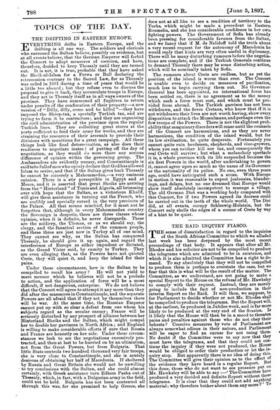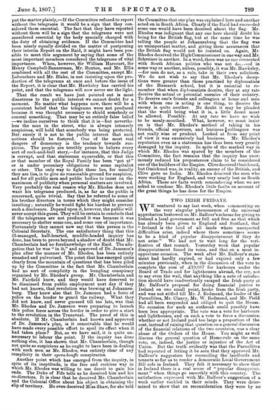THE RAID INQUIRY FIASCO. T HE sense of dissatisfaction in regard
to the inquiries of the South African Committee to which we alluded last week has been deepened by the most recent proceedings of that body. It appears that after all Mr. Rhodes and his solicitor are not to be compelled to produce the telegrams which are admitted to be in existence, and which it is also admitted the Committee has a right to de- mand. To say absolutely that they will not be compelled to produce them is perhaps to overstate the case, but we fear that this is what will be the result of the matter. The Committee, as we understand, are not going to make a special Report to the House on the refusal of Mr. Hawksley to comply with their request. Instead, they are merely going to include the fact of non-production in their interim Report on the Raid. It will then, we suppose, be for Parliament to decide whether or not Mr. Rhodes shall be compelled to produce the telegrams. But the Report will, at the earliest, be produced in Jubilee week, and is far more likely to be produced at the very end of the Session. Is it likely that the House will then be in a mood to threaten pains and penalties against those who do not obey their behests ? Coercive measures by vote of Parliament are always somewhat odious in their nature, and Parliament will be eager to find an excuse for not using them. No doubt if the Committee were to say now that they must have the telegrams, and that they could not con- tinue the inquiry if they were not produced, the House would be obliged to order their production or let the in- quiry stop. But apparently there is no idea of doing this. The Committee will give their opinion as to the effect of the evidence they have heard in a regular Report. But this done, those who do not want to see pressure put on Mr. Hawksley will be able to say :—' The Committee have produced a very decided and definite Report without these telegrams. It is clear that they could not add anything material ; why therefore bother about them any more ? ' To put the matter plainly,—If the Committee refused to report without the telegrams it would be a sign that they con- sidered them essential. The fact that they have reported without them will be a sign that the telegrams were not considered essential by the body specially charged with the duty of obtaining evidence. If the Committee had been nearly equally divided on the matter of postponing their interim Report on the Raid, it might have been pos- sible to meet this argument by saying that some of the most important members considered the telegrams of vital importance. When, however, Sir William Harcourt, Sir Henry Campbell-Bannerman, Mr. Buxton, and Mr. Ellis combined with all the rest of the Committee, except Mr. Labouchere and Mr. Blake, in not insisting upon the pro- duction of the telegrams at once and before the issue of the Report, it is clear that Mr. Hawksley has carried his point, and that the telegrams will now never see the light.
That the result we have just pointed out is most disastrous to the public interest we cannot doubt for a moment. No matter what happens now, there will be a persistent belief that the telegrams were not produced because it was thought necessary to shield somebody or conceal something. That may be an entirely false belief —we incline ourselves to think that it is—but neverthe- less the man in the street, who is always intensely suspicious, will hold that somebody was being protected. But surely it is not to the public interest that such notions should be fostered. One of the most real dangers of democracy is the tendency towards sus- picion. The people are terribly prone to believe every sort of cock-and-bull story,—for instance, that this Judge is corrupt, and that statesman squareable, or that this or that member of the Royal Family has been "got at" or is under pecuniary obligations to some capitalist or other. The only way to fight these lies, for usually they are lies, is to give no reasonable ground for suspicion, and for all public men and public bodies to insist on the maximum of publicity when personal matters are involved. Very probably the real reason why Mr. Rhodes does not want his telegrams produced, is, as far as the public is concerned, quite trivial. Say that he referred to some of his brother directors in terms which they might consider insulting ; naturally he would fight his hardest to prevent such a disclosure. Depend upon it, however, the public will never accept this guess. They will be certain to conclude that if the telegrams are not produced it was because it was necessary to shelter some one, and some one of importance. Fortunately they cannot now say that this person is the Colonial Secretary. The one satisfactory thing that this ill-managed, half-hearted, muddle-headed inquiry has done, has been to prove beyond a shadow of doubt that Mr. Chamberlain had no foreknowledge of the Raid. The alle- gation that he was " in it," and approved of Dr. Jameson's plan after the manner of Mr. Rhodes, has been entirely smashed and pulverised. The point that has emerged quite clearly from the mountain of questions that has been piled up by the Committee is the fact that Mr. Chamberlain had no sort of complicity in the bungling conspiracy organised by Mr. Rhodes's group. Mr. Chamberlain and Mr. Fairfield knew, and they would have deserved to be dismissed from public employment next day if they had not known, that revolution was brewing at Johannes- burg. They knew also that Dr. Jameson had a force of police on the border to guard the railway. What they did not know, and never guessed till too late, was that Mr. Rhodes and Dr. Jameson were preparing to launch this police force across the border in order to give a start to the revolution in the Transvaal. The proof of this is absolute. If Mr. Chamberlain had known and approved of Dr. Jameson's plan, is it conceivable that he would have made every possible effort to spoil its effect when it had taken place ? But, as we have said, it is quite un- necessary to labour the point. If the inquiry has done nothing else, it has shown that Mr. Chamberlain, though not quite as suspicious as he ought to have been in dealing with such men as Mr. Rhodes, was entirely clear of any complicity in their opera-bow:re conspiracies. Another point which has emerged from the inquiry, in spite of its ineptitude, is the free and reckless way in which Mr. Rhodes was willing to use deceit to gain his ends. The Duke of Fife tells us he deceived him and his co-directors. It is clear that he deceived Mr. Chamberlain and the Colonial Office about his object in obtaining the slip of territory. He even deceived Miss Shaw, for she told the Committee that one plan was explained here and another acted on in South Africa. Clearly if the Raid had succeeded some one would have been deceived about the flag. Mr. Rhodes was indignant that any one here should doubt his being for the British flag, but at the same time he was telling the people at Johannesburg that the flag was an unimportant matter, and giving them assurances that the British flag would not be insisted on. Again, Mr. Rhodes deceived the HighCommissioner in one way and Mr. Schreiner in another. In a word, there was no one connected with South African politics who was not det...3ved in some way or another, unless, possibly, it was Mr. Hawksley, —for men do not, as a rule, take in their own solicitors. We do not wish to say that Mr. Rhodes's decep- tions were greater than those practised by diplomatists of the Bismarck school, but it is essential to re- member that when diplomatists deceive, they at any rate deceive the actual or potential enemies of their country. To deceive one's friends and colleagues at home and men with whom one is acting is one thing, to deceive the enemy is quite another. No doubt it may be pleaded that the world being what it is, a little deceit must be allowed. Possibly. At any rate we have no wish to be mealy-mouthed. What, however, we must insist on is that Mr. Rhodes's method of taking in his friends, official superiors, and business 6 colleagues was not really.wise or prudent. Looked at from any point of view it was excessively bad business. Mr. Rhodes's reputation even as a statesman has thus been very greatly damaged by the inquiry. In spite of the marked way in which Mr. Rhodes was spared by the members of the Committee, the fact remains that the inquiry has enor- mously reduced his preposterous claim to be considered one of the builders of the Empire. Clive deceived 0 michu nd, but Omichund was, in reality, an enemy of the British, and Clive gave us India. Mr. Rhodes deceived the men who were working for England, and very nearly lost us South Africa. These are facts worth remembering when we are asked to condone Mr. Rhodes's little faults on account of the great things he has done for the Empire.







































 Previous page
Previous page